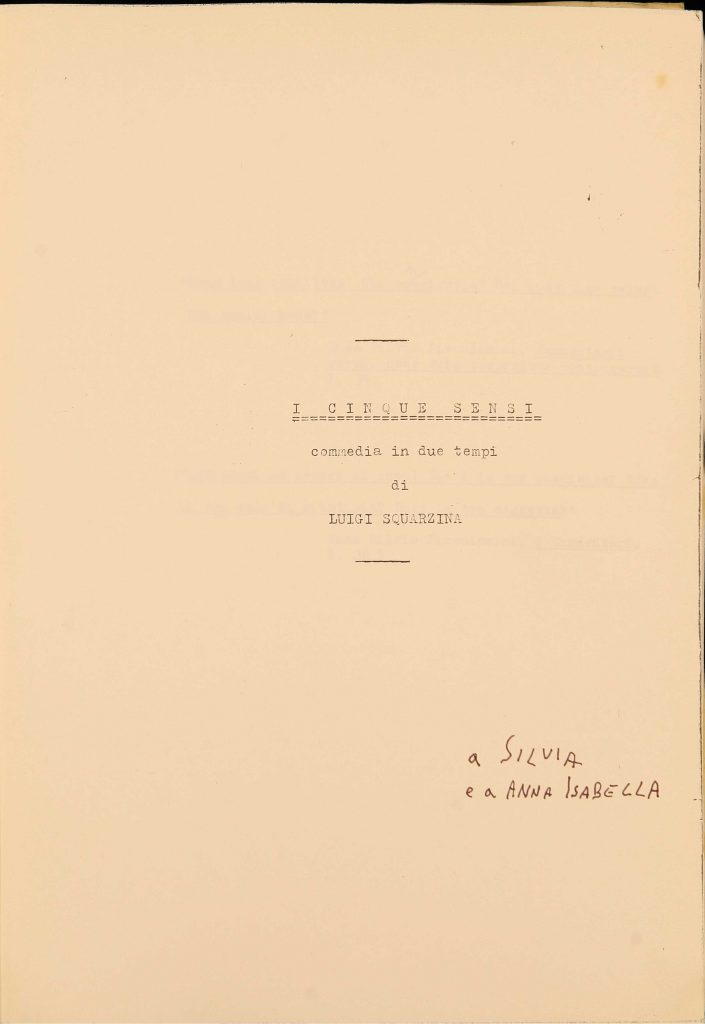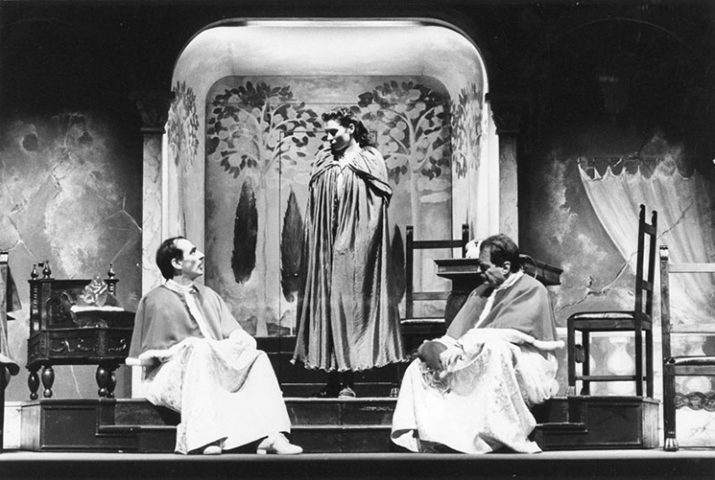Debutto: Trento, Teatro Auditorium S. Chiara, 5 gennaio 1987
| Regia | Luigi Squarzina |
| Regista assistente | Gianni Fenzi |
| Scene e Costumi | Gianfranco Padovani |
| Musiche | Matteo D’Amico |
| Produzione | La Contemporanea ‘83 |
Personaggi e interpreti
| Pio II, direttore uscente dell’ENREI | Sergio Fantoni |
| Paolo II, direttore entrante | Piero Di Iorio |
| Ercole, impiegato | Guido Sagliocca |
| Ettore, impiegato | Gianni Fenzi |
| Timoteo, rappresentante sindacale, membro del consiglio di Amministrazione | Lello Serao |
| il V Consigliere di Amministrazione | Lanfranco Gasparri |
| il VI Consigliere | Piero Maggi |
| il I delegato dei manifestanti | Mario Biagi |
| il II delegato | Giancarlo Garzia |
| l’Ispettore, funzionario ministeriale | Enrico Salvatore |
| Gin, ragazzo del bar | Giampiero Ingrassia |
| Alma, presidente del consiglio di Amministrazione | Benedetta Buccellato |
| Sibilla, segretaria del direttore | Antonella Fattori |
| Rosa, moglie di Ercole | Fiorella Buffa |
| Tea, dattilografa, sorella minore di Rosa | Paola Fulciniti |
Scritta tra il 1982 e il 1986, Squarzina immagina, con toni grottescamente caricaturali, le vicende di uno dei tanti enti pubblici inutili, prosperati negli ottanta all’ombra di un’amministrazione pubblica inefficiente e clientelare, l’Ente Nazionale riutilizzazione Enti Inutili (E.N.R.E.S.) , commissariata in vista della sua ristrutturazione. Ne descrive il grigiore e l’assenteismo degli impiegati, le tresche tra dirigenti e segretarie e le operazioni di corruzione messe in atto. La trama è complessa: il vecchio direttore paternalistico soprannominato Pio II, colpito da ictus mentre faceva l’amore in ufficio con la sua segretaria, viene sostituito da un nuovo efficiente e dinamico direttore, soprannominato Paolo II, che, al fianco di una presidentessa manager, intende imporre ordine e rigore. Per difendersi da questo pericolo alcuni impiegati, compreso un grottesco sindacalista, aderiscono pienamente al piano di conservazione del vecchio direttore che, avendo scoperto il punto debole della presidentessa manager, cioè lo spasmodico desiderio di un figlio, convince un grigio impiegato dell’ufficio del protocollo, già padre di sette figli, a metterla incinta. La presidentessa perde la sua aggressività, diventa dolce e conciliante e tutto ritorna come prima. Anche questa è una commedia di grande impegno civile, fortemente ancorata alla realtà, vista peraltro non con la consueta indignazione, ma con aristocratico distacco.
 “Ho usato la metafora dei papi Pio II e Paolo II: il primo assunse in Vaticano moltissimi suoi conterranei senesi, l’altro, veneto ed efficientista, licenziò. Dunque, l’ex-direttore e il direttore in carica, durante una festa in costume, assumevano i tratti dei due papi e Benedetta [Buccellato] si vestiva da Florence Nightingale, la creatrice della Croce Rossa, sublimazione della sua mancata maternità”.
“Ho usato la metafora dei papi Pio II e Paolo II: il primo assunse in Vaticano moltissimi suoi conterranei senesi, l’altro, veneto ed efficientista, licenziò. Dunque, l’ex-direttore e il direttore in carica, durante una festa in costume, assumevano i tratti dei due papi e Benedetta [Buccellato] si vestiva da Florence Nightingale, la creatrice della Croce Rossa, sublimazione della sua mancata maternità”.
Luigi Squarzina
Tratto da L. Colombo e F. Mazzocchi (a cura di), Luigi Squarzina e il suo teatro, Roma, Bulzoni Editore, 1996, p. 274
Si ringrazia Tommaso Le Pera per la concessione dell’utilizzo del materiale fotografico.

